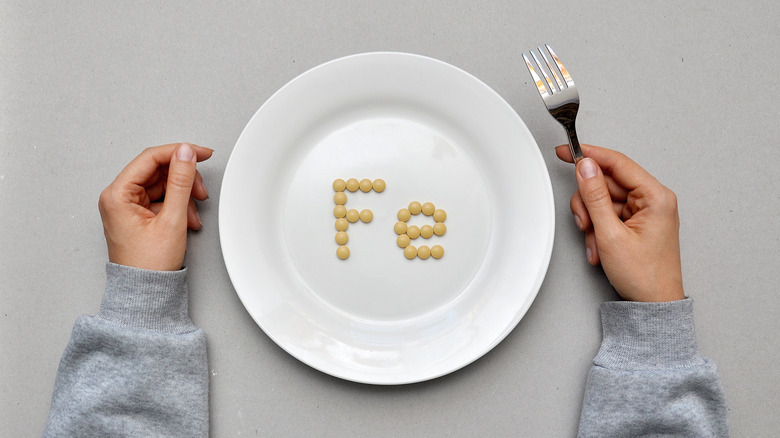Anyone with anemia will tell you that cold feet aren’t just reserved for runaway brides. Anemia, a relatively common blood disorder characterized by a lack of healthy red blood cells, is marked by the body’s inability to carry adequate oxygen to the organs and tissues (per Mayo Clinic). While several forms of anemia are congenital, the condition is more commonly acquired as a result of a nutritional deficiency.
Iron deficiency anemia (IDA) is the most prevalent form of anemia and occurs when your diet doesn’t include enough iron, or your body isn’t properly absorbing it, explains the Cleveland Clinic. Oxygen is transported from your respiratory system to the rest of your body on the back of hemoglobin, an oxygen-binding protein inside red blood cells. When you don’t intake enough iron, your body cannot make enough red blood cells, or the cells lack hemoglobin (per eLife). As a result, your organs don’t get enough oxygen, and a laundry list of uncomfortable symptoms ensue.
The symptoms of IDA typically include fatigue, shortness of breath, weakness, chest pain, increased heart rate, difficulty concentrating, dizziness, pale skin, and cold hands and feet (per Mayo Clinic).
Anemia and anxiety

As pointed out by Calm Clinic, many of these anemia symptoms closely resemble those of anxiety. For that reason, they suggest that people often think they are experiencing anemia when it’s really anxiety or vice versa. But can the correlation between anxiety and anemia attribute to a simple case of mistaken self-diagnosis? Research suggests it goes deeper than that.
It’s not uncommon for anemia and anxiety to exist simultaneously. The symptoms of anemia can put a lot of stress on the body which, Calm Clinic explains, can send signals to the brain that there is cause to be anxious. A 2024 study published in BMC Psychiatry reported that participants with IDA experienced a significantly higher incidence of anxiety disorders, depression, sleep disorders, and psychotic disorders, and that iron supplementation in participants with IDA was associated with a significantly lower risk of psychiatric disorders in comparison to those who did not take iron supplements. What’s more, a 2024 review published in the Journal of Nutritional Biochemistry gathered a strong body of evidence suggesting that the altered metabolism of iron and other metals can improve emotional behavior.
In fact, Dr. Uma Naidoo of Massachusetts General Hospital told Livestrong that if you’re experiencing anxiety and suspect you have IDA, increasing your iron intake can help manage the physical symptoms of anemia, improving overall physical and emotional wellbeing. However, if your symptoms impact your daily life, it’s always best to schedule an appointment with your doctor.



